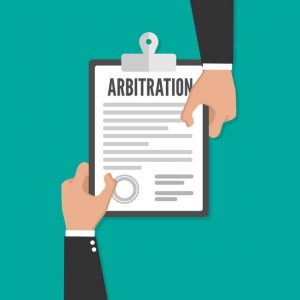New Jersey Court Enforces Agreement to Mediate Workplace Disputes
June 27, 2019Using a High Low Agreement to Counter Confirmation Bias in an Insurance Mediation
July 2, 2019Texas Court Says Express Consent is Key if You Want Your Mediator to Arbitrate Disputes That Arise When Memorializing a Settlement
 We previously blogged about the process known as “med-arb” under which the parties to a failed mediation agree to retain the mediator to arbitrate their dispute. We also highlighted a particular application of med-arb under which the parties to a mediated settlement empower the mediator to arbitrate any disputes that may arise when memorializing the settlement in a more formal agreement.
We previously blogged about the process known as “med-arb” under which the parties to a failed mediation agree to retain the mediator to arbitrate their dispute. We also highlighted a particular application of med-arb under which the parties to a mediated settlement empower the mediator to arbitrate any disputes that may arise when memorializing the settlement in a more formal agreement.
If parties wish to empower their mediator to arbitrate open issues, however, the language in any settlement reached at the conclusion of a mediation should clearly and unambiguously express the consent of both parties for the mediator to serve in that role, as per a recent Texas appellate court decision. Star Elec., Inc. v. Northpark Office Tower, LP, No. 01-17-00364-CV, 2019 WL 2094328 (Tex. App. May 14, 2019). Absent the express consent of both parties to arbitrate, the mediator’s resolution of any disputes that arise while memorializing the settlement will not be given preclusive effect by a court and may need to be relitigated.
In Star, the plaintiff purchased electricity from suppliers and resold it to commercial and residential users throughout Texas. The defendant corporation agreed to purchase electricity from plaintiff for its Houston office building. The underlying contract provided for the defendant to pay an early termination fee as liquidated damages if it terminated or defaulted before the end of the agreed upon term.
Two years later, after the defendant’s CEO repudiated the agreement, the plaintiff sued to collect all outstanding balances and an early termination fee (together totaling approximately $500,000). In response, the defendant’s CEO transferred the office building (which was the defendant’s sole asset) to a different entity, and then encumbered it with a mortgage, thus leaving the defendant without assets to satisfy a judgment. The plaintiff thereupon named as defendants several other entities and individuals who were transferees of the mortgage proceeds.
In May 2011, approximately seven months after the action was filed, the parties attended a mediation with mediator Alan Levin, which led to a partial settlement under which the plaintiff agreed to dismiss its claims against the transferees in exchange for an agreement by the defendant’s CEO to pledge collateral worth approximately $1 million to satisfy any judgment that the plaintiff might obtain in the underlying action. The mediated settlement agreement provided in relevant part as follows:
If one or more disputes should arise with regard to the interpretation and/or performance of this agreement or any of its provisions, or the drafting or execution of further settlement documents, the parties agree to attempt to resolve any such dispute first by telephone conference with Alan F. Levin, mediator herein, who facilitated this settlement. If the parties cannot resolve their differences by telephone conference, then each agrees to schedule one day of mediation with Alan F. Levin, mediator herein, within thirty (30) days after the unsuccessful telephone conference to attempt to resolve the disputes. The parties shall equally share the costs of such mediation . . . Alan F. Levin has the final decision on any ambiguity in the settlement agreement.
Subsequently, in September 2011, Levin issued an “order” stating that the parties had concluded the mediation with a settlement agreement under which they requested Levin to serve as an “arbitrator.”
Meanwhile, to comply with his obligation to pledge collateral, the defendant’s CEO identified a tract of land allegedly worth $800,000. In November 2011, after the plaintiff’s appraiser concluded that the tract was worth less than $800,000, Levin issued another “order” directing the defendant to pledge additional collateral. That “order” also identified Levin as the “arbitrator.”
After the defendant failed to timely pledge additional collateral, Levin issued a second “order” in November 2011 concluding that whether the defendants had breached the settlement agreement reached at the mediation by failing to timely pledge additional collateral was not within the scope of his authority. The plaintiff then added a claim for breach of the settlement agreement in the underlying action based on, inter alia, the defendant’s failure to pledge additional collateral.
Eight months later, however, the defendant delivered a check to Levin as additional collateral. Levin then entered a new “order,” which again identified him as an “arbitrator,” and stated that delivery of the check fulfilled defendant’s obligation under the settlement agreement to pledge collateral to satisfy any judgment obtained by plaintiff. In other words, as far as Levin was concerned, any breach of the settlement agreement had been cured.
Based on this latest “order,” the defendant moved for summary judgment on the plaintiff’s claim for breach of the settlement agreement on the ground that it was barred by res judicata. Specifically, the defendant argued that Levin was acting as an arbitrator, not a mediator, when he concluded that the defendant had complied with the settlement agreement by delivering the check, and thus Levin’s order constituted a final, non-appealable determination on the merits adjudicating the plaintiff’s claim for breach of the settlement agreement. The plaintiff responded that the parties did not enter into an arbitration agreement; that Levin was authorized to act as a mediator, not as an arbitrator; and that his authority under the terms of the mediated settlement was limited to resolving ambiguities in the agreement and determining the value of the properties that defendants were to pledge as collateral.
The trial court agreed with defendant and granted the motion for summary judgment. Plaintiff appealed (in fact, there were multiple issues on appeal, but we’ll focus on the mediation point).
The appellate court reversed. It agreed that an arbitration award is given the same effect as a court judgment, and thus has preclusive effect for res judicata purposes. But it further noted that an arbitration cannot be ordered in the absence of an agreement to arbitrate. Examining the plain meaning of the mediated settlement, the appellate court concluded that:
Nothing in the Settlement Agreement suggests that the parties agreed to arbitrate their dispute or that Levin was to act as an arbitrator. Although the agreement reflects that the parties gave Levin “the final decision on any ambiguity in the … agreement,” neither party identifies any ambiguity.
The fact that Levin later identified himself as an “arbitrator” in “orders” issued subsequent to execution of the settlement agreement was not controlling since, while a mediator may also serve as an arbitrator in the same dispute, both parties must expressly consent to this arrangement, and such express consent was lacking here. If express consent to arbitrate is lacking, then the mediator’s resolution of any dispute does not constitute a final adjudication on the merits for res judicata purposes.
A key takeaway from Star is that if the parties to a mediated settlement wish to empower the mediator to arbitrate any disputes that arise in connection with memorializing the settlement, the language in the settlement should clearly and unambiguously express their consent to the mediator serving in that capacity. Absent such language, a court may decide to revisit the mediator’s resolution of such disputes (although the mediator’s determinations will surely be persuasive, especially if accompanied by reasoning).

